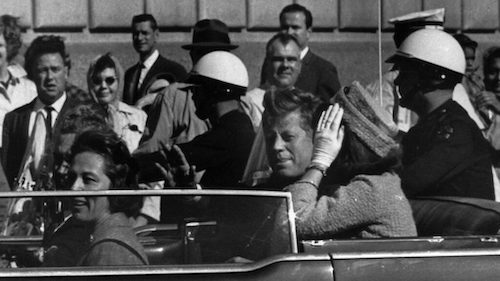
Fifty-six years ago today, I was enjoying a typical day in high school. I don’t remember which class I was sitting in when there was an announcement over the public address system. President Kennedy had been shot. He was in Dallas, Texas, and had been taken to a nearby hospital. No word yet on his condition.
My world started to crumble around me as we waited for further news. My classmates looked as shocked as I felt. What we were hearing was impossible. Shot? A president of the United States couldn’t be assassinated, not in 1963. That was something that only happened in far-away, uncivilized countries. It was a mistake.
Time stopped. No one spoke. Not even the teacher, who appeared as shattered as the rest of us. It may have only been moments before the voice again came from the speakers, this time more broken. “The President is dead.” We sat there for a while, each of us insulated in our thoughts. The teacher had nothing to say and finally dismissed class early.
As I trudged through the halls, I tried to hide my tears, although everyone else was crying, too. Some part of my mind was trying to reason. I didn’t even like President Kennedy. He was a Democrat, and we were Republicans. Nobody I knew thought he was that great a president. Of course, it was sad when anyone was murdered, his life cut short before its time. But we didn’t know him personally, so why were we all in such grief?
In subsequent years, I thought it was the loss of innocence that we were mourning. When I compared notes with other Americans, I observed that everyone remembered where they were when they heard that Kennedy was shot. None of the assassinations that happened in later years, like Bobby Kennedy and Martin Luther King, Jr., had the universal impact that JFK’s had.
And no other murder has been so studied and analyzed and theorized. Even after all these years, I don’t know what happened in Dallas that day. Naturally, some of the theories seem more plausible to me than others. I discarded my naive belief that “public servants” were dedicated to serving the public long ago.
Ironically, the assassination turned a mediocre president into a hero and martyr. And that’s assuming he wasn’t killed by the government he sometimes defied. That occasional defiance doesn’t mean he was the shining knight of Camelot, as he has sometimes been portrayed. Still, he didn’t cause as much harm as many presidents.
Remembering John F. Kennedy on the anniversary of his death saddens me. The sorrow is for those teenagers who had such a distorted understanding of the world around them. Many of them still see government as the all-caring authority figure–their god–who will take care of them. Yet the depredations of government on the people of this country have only increased in the last 56 years.
Retirement today is not what my generation was taught to expect. Most of us would have thrived if we had been allowed to keep our hard-earned money and plan for our retirement ourselves. Instead, our wealth was taken without our consent, with promises that were never meant to be honored. As always, the politicians who made the pledges would be long gone before the consequences of their actions came to light. Even now, most Americans don’t understand what the government has done to our wealth. Was Kennedy planning something that might have mitigated the damage, as some people thought? Who knows?

